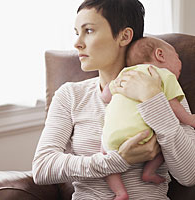New Studies Show 1 in 7 Women Are Affected by Postpartum Depression
 It has been known for years that some women suffer from postpartum depression after they give birth. But until recently, no one had documented just how many go down that difficult path.
It has been known for years that some women suffer from postpartum depression after they give birth. But until recently, no one had documented just how many go down that difficult path.
In the largest research study to date, figures show that as many as 1 in 7 women suffer from this condition. The study was published in the journal JAMA Psychiatry and found that among the women in the study (who were followed for a year after their delivery), approximately 22 percent were diagnosed with depression.
The study followed 10,000 women who gave birth at an obstetrical hospital in Pittsburgh. They were asked to participate in a short phone interview four to six weeks after they delivered their newborns.
According to Dorthy Sit of the University of Pittsburgh, one of the study's investigators, "We asked them whether they had been able to laugh and see the funny side of things." The new mothers were also asked by the researchers about their "ability to look forward with enjoyment to things, whether or not they're blaming themselves necessarily when things go wrong, feeling anxious or worried for no good reason, being scared or panicky for no good reason."
The callers found that 14 percent of the women screened were at increased risk for postpartum depression, a number which was consistent with other recent studies. However, Sit's study with home visits for further evaluation unveiled the symptoms were very serious in many cases.
"We discovered 20 percent had suicidal thoughts -- these are thoughts of death, thoughts of wanting to die, not wanting to wake up, just escape," Sit says. "In fact, some patients with very severe symptoms had made the decision to take their lives."
Sit claims that by screening all pregnant women and new mothers, a diagnosis of depression can be made sooner and treatment could begin in a more timely fashion.
While it is still unknown as to why some women are more at risk for postpartum depression than others, possible factors include genetics, hormonal fluctuations and sleep deprivation.
Rebecca Stark of the Cleveland Clinic directs the obstetrics unit there, where patients are screened for depression during their third trimester of pregnancy and again after their baby is born.
Stark believes screening is important because once women are diagnosed the treatments are very effective.
Many women are too guilt-ridden or embarrassed by their depression to admit they feel bad so they do not get the treatment they require. Stark tries to counteract this attitude by letting patients and their families know that "this is out of your control."
Posted in New Studies Show 1 in 7 Women Are Affected by Postpartum Depression
Ask a Question Or Join a Discussion


